
Creating a World of Peace - The Thought and Works of Sun Myung Moon by Joon Ho Seuk
|
|
Creating a World of Peace - The Thought and Works of Sun Myung Moon by Joon Ho Seuk |
Volume 4 - Marriage, the Blessing and World Peace [Part 3 of 5]
3. The Decline Of Marriage And Family
"However, the fall of Adam and Eve meant that humanity lost True Parents. That day we became orphans. Brothers turned into enemies. As a result, nations came to develop antagonistic relationships rather than friendly ones. Accusations abound on every level."
Sun Myung Moon
It is a tragic reality that, all around the world, marriage bonds are becoming less enduring.
Polls show that young people continue to aspire to marriage but there has been a general devaluation of the significance of marriage and its necessary connection with love, sex and childbearing.
Marriages are less enduring when the larger culture no longer considers them worthy of special status, protection and authority.
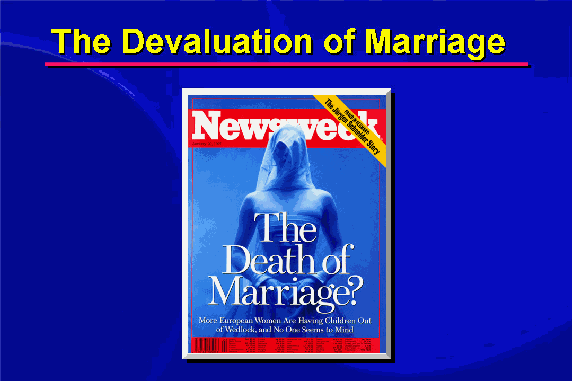
In many modern societies, a focus on the rights of individuals has diverted attention from the pivotal role that traditional two-parent families play in maintaining social order. With the disruption of time-honored patterns of family life, more children are being raised by single parents. Modern thinking has shifted its focus from a culture of duties to a culture of rights in which the marriage bond is viewed as a voluntary contract that could be easily broken.
The social changes that accompany industrial and technological modernization have created an upheaval in the cultural values that formerly supported marriage. With the counter-culture revolution of the 1960s, the communal and sacred dimensions of marriage began to fade away, leaving merely a personal dimension.
The Loss of the School of Love
From The Path to World Peace in View of God's Will, New York, NY, October 20, 2001.
What do you feel when you look at the reality of human society and at the youth of the contemporary world? Do you feel hope for a bright future? I believe that you experience agony over the increasing rates of crime, violence, drug abuse, immorality, corruption, teen pregnancy and so forth.
These arise out of a confusion of values and foretell darkness enveloping our youth. How did we arrive at this point?
Better school systems and social improvements would have delayed the onset of these problems, but these endeavors do not address the fundamental cause of these problems, which is the breakdown and loss of families. This breakdown is a product of the time we are in, a time when humankind is harvesting the fruit sown by the loss of the first family of true love.
The destruction of the foremost school of true love leads to the phenomena of family breakdown, with enormously destructive side effects. This breakdown not only causes personal anxiety but also leads to manifold problems on the national and worldwide levels. Of particular concern is the emotional instability of youth, which leads to changing life goals, spiritual wandering, and even deviation from healthy lifestyles.
World leaders who are concerned over the future must take very seriously the real problems of youth avoiding marriage, rampant divorce, and so forth, which destroy the fundamental foundation for families.
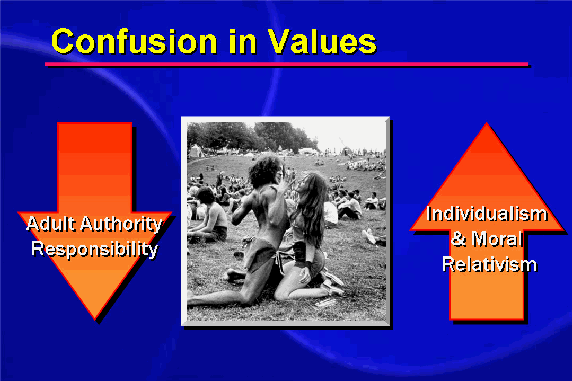
Popular culture reflects this confusion in values. Contemporary music, movies, and literature elevate the individual over the family and promote self-gratification at the expense of social good. Rather than a culture emphasizing responsibility, we find a culture that focuses on individual rights.
There is less emphasis on honoring the marriage vows and the nobility of serving one's spouse and children. Not only has divorce lost its stigma, but economic, social and legal policies sometimes penalize couples who marry. These factors have contributed to what some have called a divorce culture.
Young people have become less likely to marry, those who do marry have less successful marriages, and marriages are more likely to break up. The wreckage of the marriage culture includes divorce, single-parent households and cohabiting relationships. Those who suffer most from these trends are the children.
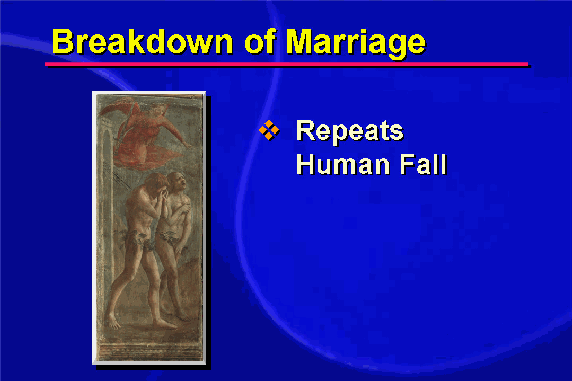
These developments are particularly painful to Reverend Moon since they are a direct contradiction of God's ideal. In this scene of breakdown and loss of love, in addition to the human suffering, he sees a daily repetition of the human fall and therefore a constant reliving of God's pain.
The Loss of God's Blessing
From The Path to World Peace in View of God's Will, New York, NY, October 20, 2001.
Having lost the First and Second Blessings, humankind does not understand how important it is to perfect one's individuality. As a true individual we can experience sacred and eternal conjugal love.
Most of today's youth are not educated in a thoroughgoing way about the importance of keeping purity before marriage and reaching individual maturity through true love. Thus they do not understand the value of true love, which is the fundamental root of joy, happiness and all ideals.
The tendency to make light of trust and fidelity between husband and wife, and to ignore the sacredness of marriage, is an internal cause of indescribable disasters and tragedies for humankind. True love has no place in the so-called free sex culture, in which people seek only the physical love between a man and a woman as the cardinal but momentary pleasure.
The rapid spread of HIV/AIDS and sexually transmitted diseases threatens the very existence of the human race -- it is said that there is no safety zone against the AIDS virus. A greater terrorism than that over which the entire world is now trembling is before our eyes, allowing us no safety zone.
Once contracted, its victims must give up their dreams for happiness, ideals, and life itself. Unless we resolve this catastrophe plaguing our planet, how can we claim that we are world leaders?
A. Divorce Culture
Perhaps the most obvious signs of the decline of the institution of marriage are the rising divorce rates. Divorce rates rose 200 percent in the United States between 1960 and 1998; an estimated 40 to 50 percent of all first marriages will fall apart. Similar rates are found in parts of Europe.
In Japan, an estimated one in three marriages will end in divorce. In China, the divorce rate is 1 percent. This may seem small by Western standards, but it causes great concern in the most populated nation of the world, where divorce rates rose 130 percent between 1985 and 1992.
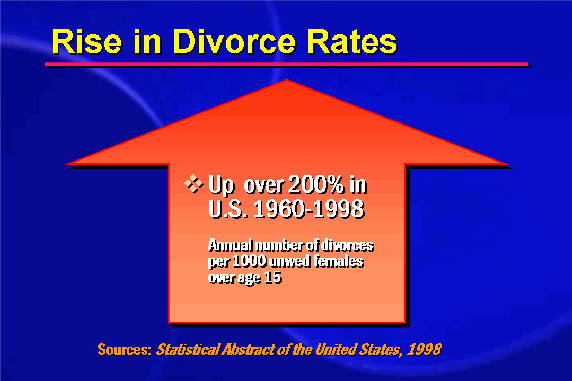
This steady decline has sometimes been aided by government policy such as the adoption of "no-fault" divorce laws in the United States in 1969, which made divorce much easier to obtain. This revision effectively altered the vows of marriage from a solemn commitment into a contract of convenience, eroding the institution of marriage.
It was hoped that opening up access to divorce would allow unhappy couples to dissolve their union, and the remaining marriages would be happier. However, when divorce is more readily available and acceptable, there is less incentive for husband and wife to persevere through difficult times and work to strengthen their marriage.
Individualism and the Loss of Commitment
From The Power of True Love Transcends All Boundaries, Belvedere Estate, Tarrytown, NY, September 17, 2000.
What is the definition of good and evil? You may define evil as the creation of more and more boundaries. Does anyone here like extreme individualism? Why not? Is it not the general tendency for each person to feel they are the center, the ringleader, and others should do his or her bidding?
Whatever they see, they want to follow; whatever they smell, it is for themselves; whatever they touch, it is theirs. This type of person wants to go with his or her own feelings. Then although you look alive, you are a dead body. There would be no unity of your eyes, ears and touch.
What about the concept of freedom? Is the freedom to do whatever you want a good concept? What if each race insists that the other races do things their way? What if each generation were to insist on it?
What kind of world would you expect? It would be chaotic; it would be complicated chaos. The most fearful word is self-centered individualism that creates borderlines. We must like the word freedom, but there is some condition.
Where can you find such a freedom that gives you the ability to kick away all boundaries? You say true love, but you've never seen it. What is it?
It is simple: live for the sake of others. Don't you think that is right? Suppose in your family there is a very fierce grandfather, always giving orders and judging and criticizing. But if you live for him for many years, don't you think he will start smiling and give you a warm feeling? Elimination of borderlines never comes from selfish individualism.
If you continue with a selfish attitude, you will carry your borderlines into the spirit world.
The greatest human rule is, "love your enemy." But at first glance, it sounds foolish. What does it mean? To truly love your enemy more than yourself means you will eventually enter his country and become its king, because there is no border.
So if you truly love your enemy more than yourself, you will have free travel throughout your enemy's territory. If you offer your love to your enemy with love that is absolute, unique, eternal and unchanging, then you will own absoluteness, uniqueness and eternality.
With true love, even if you travel around, your love will stay the same. If such love exists between family members, then it will exist forever, because God is forever and you will be with God.
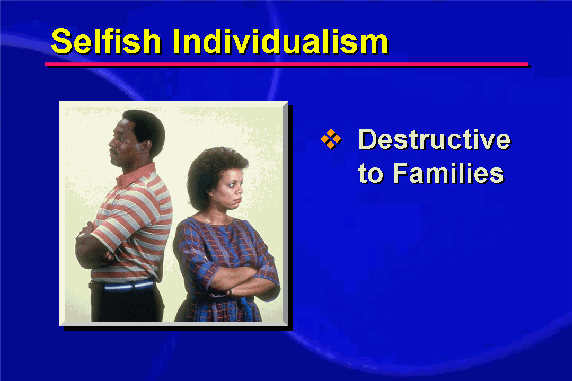
Reverend Moon believes that selfish individualism is destroying marriages and families. The focus on self-fulfillment above all else means that commitment to the marriage vows becomes tenuous and fragile.
Research shows that the belief that an unrewarding marriage should be jettisoned may lead some people to invest less time in their marriage and make fewer attempts to resolve marital disagreements. By adopting attitudes that provide greater freedom to leave unsatisfying marriages, people may be increasing the likelihood that their marriages will become unsatisfying in the long run.
B. The Impact of Divorce
The sequence of changes initiated by divorce is complex. Divorced mothers and their children often have access to less income, and to save money the parent who has custody may move to cheaper housing. The uprooted children have to adjust to different neighborhoods and new schools. As the years go by, fathers typically have less contact with their children and provide less financial support.
Children may have to cope with their mother's new love interests, live-in boyfriends, stepfathers, stepbrothers and stepsisters. Remarriages are more likely than first marriages to result in divorce, with new losses, more moves and more changes in household configurations.
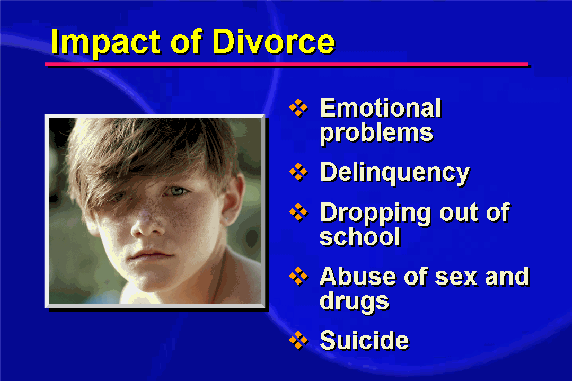
When divorce was made easier to obtain, it was thought that dissolving an unhappy marriage would be beneficial for the children. American sociologist Judith Wallerstein is widely credited for exposing the false promises of divorce. Originally a supporter of policies that made it easy to dissolve a marriage, she was shocked at what she learned when she interviewed children ten or more years after their parents' divorce.
Her research shows that divorce has stunningly bad long-term effects on children. Parents' divorce was the greatest source of pain, disillusionment and identity problems. Experiencing their parents' divorce tainted the children's own relationships and eventual marriages. No one was left unaffected.
Half of the children developed serious alcohol or drug dependencies, some before the age of 14. Children were worried that their relationships would fail; they feared abandonment and hesitated to have children themselves. Suicide rates for children of divorce are significantly higher than for children from intact families.
C. Single-Parent Culture
Marriage rates have been declining in the United States. Only 56 percent of adults are currently married, a decrease of 40 percent since 1960. Marriage is no longer considered essential to parenthood. In the course of a decade, the number of Americans marrying decreased by 6 percent and births outside of marriage increased more than 400 percent.
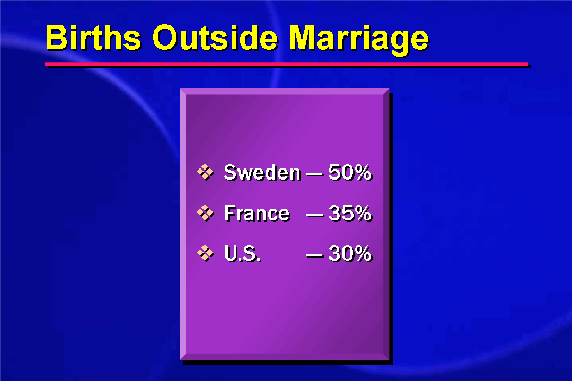
Increasing numbers of children are growing up deprived of the committed love, nurturing, guidance, teaching, protection and role models of both their father and mother.
In many modern societies, a focus on the rights of individuals has diverted attention from the pivotal role that traditional two-parent families play in maintaining social order. With the disruption of time-honored patterns of family life, more children are being raised by single parents.
To bear children outside of marriage is no longer stigmatized in many Western countries. Out-of-wedlock birthrates range from 30 percent in the United States to 50 percent in Sweden. Social welfare programs have been taking over the father's role of financially supporting the mother and children. In some American neighborhoods, teen boys gain status by getting their girlfriends pregnant.
D. Cohabitation
There is a basic human need for affiliation, and if marriage is discredited, many adults seek some alternative to single living. While cohabitation was illegal in the United States until 1970, today it is fast becoming a popular alternative to marriage.
To some, cohabitation seems like a good way to gain the benefits of marriage and avoid divorce. It offers time to find out about a future mate without needing legal or religious permission to dissolve the union.
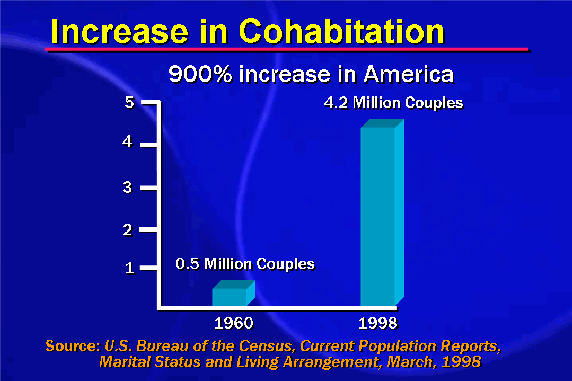
However, marriage and cohabitation are qualitatively different. Cohabiting relationships are less satisfying than marriage relationships.
Cohabiting couples are less happy, less faithful to each other, less satisfied with their sexual relationship, and less connected to their parents.
Research has shown that domestic violence is much more common among cohabiting partners than among married partners; some researchers estimate the rate to be nine times as great. Furthermore, instead of reducing the likelihood of divorce, cohabitation has the opposite effect. Couples who lived together before marriage have a higher divorce rate than couples who did not.
It is now accepted that family structure affects the well-being of children. In terms of academic performance, drug abuse, criminality, income as adults or almost any other measure, the children of married biological parents do best. Children of divorced single parents and remarried parents fare worse.
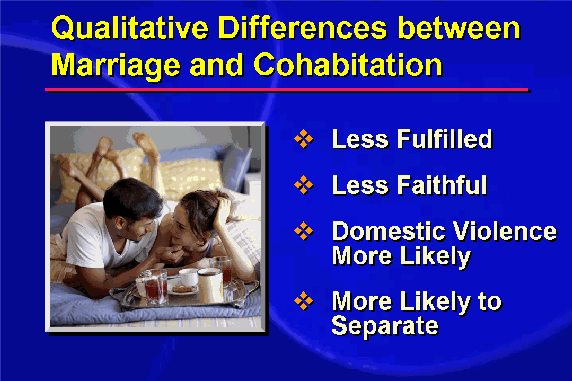
Children of women who never married fare the worst of all; this includes children of cohabiting women.
Only a sixth of cohabiting relationships last as long as three years. Thus, even if there was a father in the house at some point, the child learns that he did not care enough to stay.
In direct response to these alarming trends, Reverend Moon has endeavored to inspire the launch of a marriage culture. A beginning point is to reaffirm the value of marriage and offer a deeper understanding of the many dimensions of marriage.